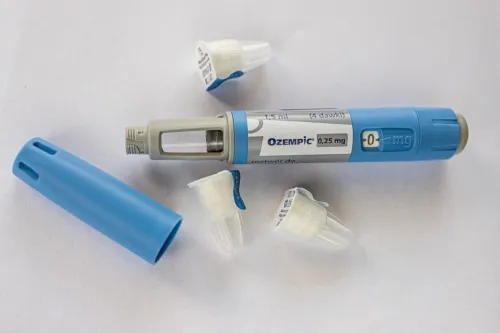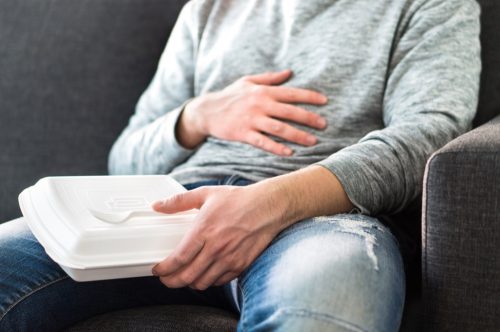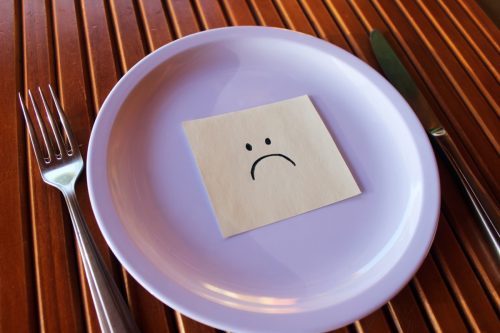What Really Happens to Your Body When You Take Ozempic, According to Doctors

It seems like everywhere you go these days, someone is talking about Ozempic, the diabetes drug that’s increasingly being prescribed off-label for weight loss. Whether you’ve just heard the buzz, you know someone who’s taking it, or you’re on the medication yourself, you may be wondering: How does Ozempic work, and what makes it so effective for weight loss?
Ozempic, which is a brand name for semaglutide (other brands include Wegovy and Rybelsus), was approved by the U.S. Food & Drug Administration (FDA) in 2017 for use in diabetes patients. Given as an injection, the drug has been shown to lessen the risk of heart attack, stroke, and other major cardiovascular events in people with heart disease and type 2 diabetes—and it also helps with weight loss, as more and more people are finding out firsthand.
“We used to have fen-phen, now we have Ozempic,” says Erin Parks, PhD, co-founder and Chief Clinical Officer at Equip, a virtual eating disorder treatment program, comparing Ozempic’s popularity to the combination of fenfluramine and phentermine known as fen-phen. That medication was widely used for weight loss before being pulled from the market in 1997 due to worry that it was causing heart problems in users.
To find out more about Ozempic, we asked doctors to explain the exact mechanism by which the drug is helping people lose weight. Read on to find out how it works, and what it’s doing to the bodies of its patients.
READ THIS NEXT: People Are Saying Ozempic Is a Weight-Loss Miracle. Is It Worth the Brutal Side Effects?
Ozempic affects both your brain and your digestive system.

Ozempic and other brands of semaglutide are what’s known as GLP-1 receptor agonists, says Raoul Manalac, MD, an obesity expert and senior director of clinical experience for Ro’s Body Program. GLP-1 stands for glucagon-like peptide, a gut hormone known as an incretin, according to Verywell Health, whose experts write that “GLP-1 receptor agonists belong to a class of medications known as incretin mimetics.”
“GLP-1 medications like Ozempic can cause weight loss by a number of pathways,” Manalac explains. “These medications act in a number of places in the body, including the gastrointestinal tract and the brain. In the gastrointestinal tract, it slows down the rate that the stomach empties, leading to feelings of fullness. There is also evidence that these medications act in the brain, reducing hunger and decreasing food cravings. These two factors combined can decrease appetite and increase the sense of fullness after smaller meals.”
People who take Ozempic report experiencing fewer food cravings.

Chester Wu, MD, medical reviewer for Rise Science, expands on how Ozempic works to help people lose weight. “GLP-1 receptor agonists mimic the glucagon-like peptide-1 hormone. When you eat, this hormone stimulates insulin secretion and suppresses the production of glucagon, which raises blood sugar. The hormone travels to the brain, helping us feel full,” Wu tells Best Life. These drugs “promote weight loss by making you feel fuller sooner, reducing food cravings, and lowering your preference for high-fat foods.”
“[Ozempic] made me feel full and made my interest in food not really there,” Susan Dixon, who took Ozempic after being diagnosed with pre-diabetes, told Healthline. “[My husband] would say, ‘What’s for dinner?’ and I thought, ‘I don’t really care.’ I’d have some cereal and a few bites of food, and I’d be OK. Food did not interest me.”
For more health content sent straight to your inbox, sign up for our daily newsletter.
The drug is not without unpleasant side effects.

If Ozempic sounds like a miracle drug, keep reading. Wu lists nausea, diarrhea, constipation, cramps, acid reflux, bloating, hair loss, and fatigue as just a few of the side effects people who take the medication may experience.
More serious (though rarer) side effects include inflammation of the pancreas (pancreatitis), changes in vision, kidney failure, gallbladder disease, and a potential increased risk of thyroid cancer, he says. “Semaglutide causes thyroid tumors in animals, but more human research is needed,” he explains.
Wu’s bottom line? “Most of what we know about the drugs comes from studies linked to the manufacturer, Novo Nordisk. So, more research needs to be done.”
Some experts say the effects of Ozempic are indistinguishable from disordered eating behaviors.

Beyond the physical impact of Ozempic, some experts are concerned about the behaviors exhibited by people taking the drug. Parks cites the abundance of Instagram accounts that patients have created to document their experiences with Ozempic.
“There’s one called ‘the Ozempic Olympics,’ and another one called ‘My Ozempic Journey,'” she tells Best Life. “Basically, they document every single day and week taking Ozempic, and what really strikes me is that they’re talking about, ‘Oh, I only threw up twice today, I was able to make it to my kids soccer practice, I’m down two pounds.'”
“Your life is being robbed of joy if you’re walking around being nauseated 24/7,” Parks says. “All of these accounts of people who are taking Ozempic, they’re really just documenting the same thoughts of everyone I treat who has an eating disorder. All they’re thinking about is what to eat. They aren’t able to enjoy life as much, because they’re feeling nauseated all the time.”
And what happens when people stop taking Ozempic? “Since it is still so new … they haven’t done any studies around what happens when you get off it,” Parks says. “But anecdotally, what we’re hearing is that you get off it, it’s just like every other weight loss drug that’s ever been invented. You gain all of your weight back, and then a little bit more.”
Best Life offers the most up-to-date information from top experts, new research, and health agencies, but our content is not meant to be a substitute for professional guidance. When it comes to the medication you’re taking or any other health questions you have, always consult your healthcare provider directly.